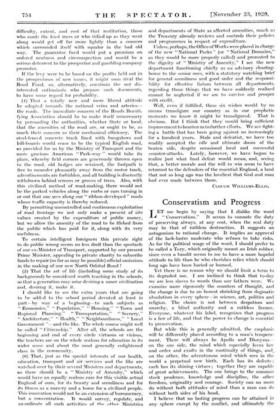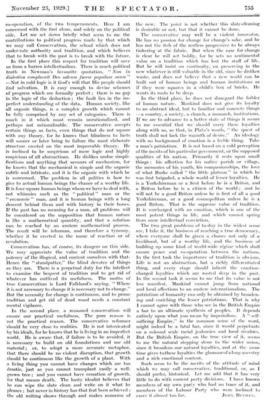Conservatism and Progress
IET me begin by saying that I dislike the word " Conservatism." It seems to connote the duty of preserving always, at any cost, when the real duty may be that of ruthless destruction. It suggests an antagonism to rational change. It implies an approval of the lack-lustre moderate who refuses to take risks. As for the political usage of the word, I should prefer to be called a Tory, which originally meant an Irish robber, since even a bandit seems to me to have a more hopeful attitude to life than he who cherishes relics which should long ago have been buried or burned.
Yet there is no reason why we should limit a term to its degraded use. I am inclined to think that to-day we are less slaves to words than our fathers were. We examine more rigorously the counters of thought, and the change is due to an honest shrinking from dogmatic absolutism in every sphere—in science, art, politics and religion. The choice is not between despotism and anarchy, a blind authority and a ruthless licence. Everyone, whatever his label, recognizes that progress is a law of life, and that the power to change is essential to preservation.
But while this is generally admitted, the emphasis will be differently placed according to a man's tempera- ment. There will always be Apollo and Dionysus— on the one side, the mind which especially loves law and order and exults in the continuity of things, and, on the other, the adventurous mind which sees in the world a perpetual new birth. Each has its defects ; each has its shining virtues ; together they are capable of great achievements. The one brings to the common stock prudence, knowledge and discipline, the other freedom, originality and courage. Society can no more do without both attitudes of mind than a man can do without both sides of his head.
I believe that no lasting progress can be attained in any sphere except by the conflict, and ultimately the co-operation, of the two temperaments. Here I am concerned with the first alone, and solely on the political side. Let me set down briefly what seem to me the contributions to political progress made by that which we may call Conservatism, the school which does not under-rate authority and tradition, and which believes that to break with the past is to break with the future.
In the first place this respect for tradition will save us from a barren intellectualism. There is much political truth in Newman's favourite quotation, " Non in dialectica complacuit Deo salvunt facere populum suum" —Not in cold logic is it God's will that His people should find salvation. It is easy enough to devise schemes of progress which are formally perfect ; there is no gap in the logic of the deduction ; the fault lies in the im- perfect understanding of the data. Human society, like all organic things, is a complex growth which cannot be fully comprised by any set of categories. There is much in it which must remain unrationalized, and perhaps not rationalizable. The conservative accepts certain things as facts, even things that do not square with any theory, for he knows that blindness to facts will sooner or later bring to failure the most elaborate structure erected on the most impeccable theory. He is inclined to be suspicious of mere logic and highly suspicious of all abstractions. He dislikes undue simpli- fications and anything that savours of mechanism, for he knows that the mechanical is simple and the organic subtle and intricate, and it is the organic with which he is concerned. The problem in all politics is how to give to actual human beings the chance of a worthy life. It is four-square human beings whom we have to deal with, not whimsies such as the " political " man or the " economic " man, and it is human beings with a long descent behind them and with history in their bones. If the past has no meaning for a man, all problems will be considered on the supposition that human nature is like a mathematical quantity, and that a solution can be reached by an austere mathematical process. The result will be inhuman, and therefore a tyranny, whether it be erected in the name of reaction or of revolution.
Conservatism has, of course, its dangers on this side. We may appreciate the value of tradition and the potency of the illogical, and content ourselves with that. Hence the " standpatter," the blind devotee of things as they are. There is a perpetual duty for the intellect to examine the bequest of tradition and to get rid of whatever has outlived its usefulness. The motto of true Conservatism is Lord Falkland's saying, " Where it is not necessary to change it is necessary not to change." But the necessity for change is continuous, and to prune tradition and get rid of dead wood needs a constant mental vigilance.
In the second place, a reasoned conservatism will ensure our practical usefulness. The pure reason is not the practical reason. The conservative reformer should be very close to realities. He is not intoxicated by his ideals, for he knows that he is living in an imperfect world. He is aware that, if failure is to be avoided, it is necessary to build on old foundations and use old material ; or, to adopt a more accurate metaphor, that there should be no violent disruption, that growth should be continuous like the growth of a plant. With a living thing you cannot have changes which are too drastic, just as you cannot transplant easily a well- grown tree ; and you cannot have cessation of growth, for that means death. The hasty idealist believes that he can wipe the slate clean and write on it what he pleases ; but never in history has that feat been achieved ; the old writing shows through and makes nonsense of the new. The point is not whether this slate-cleaning is desirable or not, but that it cannot be done.
The conservative may well be a violent innovator. He has no passion for change for change's sake, and he has not the itch of the restless progressive to be always tinkering at the fabric. But when the case for change is clear he will act boldly, for he sets no sentimental value on a tradition which has lost the stuff of life. But he will insist on continuity, on preserving in the new whatever is still valuable in the old, since he dislikes waste, and does not believe that a new world can be built out of human beings and human institutions as if they were squares in a child's box of bricks. He wants its roots to be deep.
In the third place, he does not disregard the foibles of human nature. Mankind does not give its loyalty to an abstract ideal, but to familiar and concrete things —a country, a society, a church, a monarch, institutions. If we are to advance to a better state of things it seems to me essential that we should carry these loyalties along with us, so that, in Plato's words, " the quest of truth shall not lack the warmth of desire." An ideology with no background of emotion is a feeble thing. Take a man's patriotism. It is not based on a cold perception of the merits of his particular government, or the supposed qualities of his nation. Primarily it rests upon small things : his affection for his native parish or village, the memories of his youth, his companionships, the love of what Burke called " the little platoon " in which he was first brigaded, a whole world of lesser loyalties. He is a Yorkshireman or a Scot before he is a Briton, and a Briton before he is a citizen of the world ; and he will not be a good Briton unless he is first of all a good Yorkshireman, or a good cosmopolitan unless he is & good Briton. That is the supreme value of tradition. It is surcharged with an emotion, which is one of the most potent things in life, and which cannot spring from mere intellectual conviction.
The two great problems of to-day in the widest sense are, I take it, the business of reaching a true democracy, where everyone shall be given a chance not only of a livelihood, but of a worthy life, and the business of building up some kind of world-wide regime which shall ensure peace and co-operation between the nations. In the first task the importance of tradition is obvious. Life is not an abstraction, but a richly differentiated thing, and every stage should inherit the emotion- charged loyalties which are rooted deep in the past. In the second task it seems to me that its value is not less manifest. Mankind cannot jump from national and local affections to an austere internationalism. The patriotism of humanity can only be obtained by broaden- ing and enriching the lesser patriotisms. That is why I cannot agree with those who see in the British Empire a bar to an ultimate synthesis of peoples. It depends entirely upon what you mean by imperialism. A " self- Sufficing Empire," in the common sense of the word, might indeed be a fatal bar, since it would perpetuate on a colossal scale racial jealousies and local rivalries. But the British Empire, on the true view of it, seems to me the natural stepping stone to the wider union, since it broadens our natural loyalties, and at the same time gives to these loyalties the glamourof a long ancestry and a rich emotional content.
Such seem to be the merits of the attitude of mind which we may call conservative, traditional, or, as I should prefer, historical. Let me add that it has very little to do with current party divisions. I have known members of my own party who had no trace of it, and members of the Labour Party who were inclined to































































 Previous page
Previous page